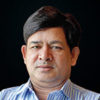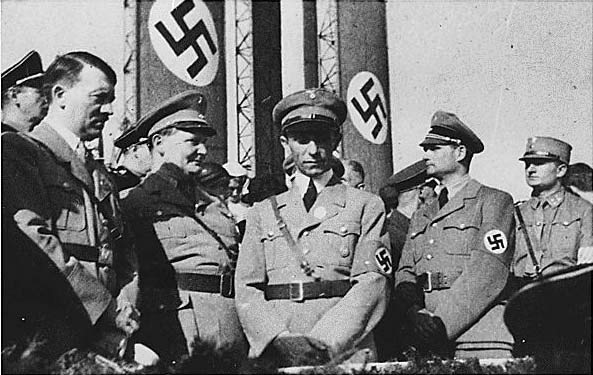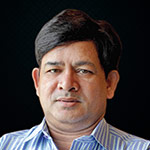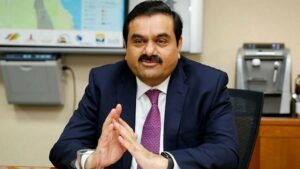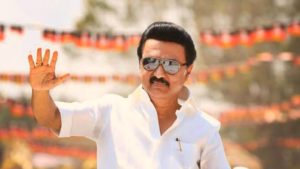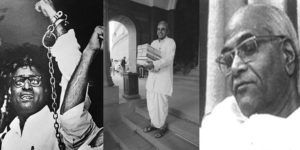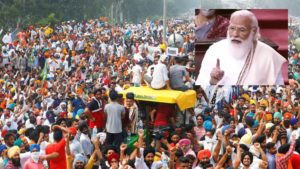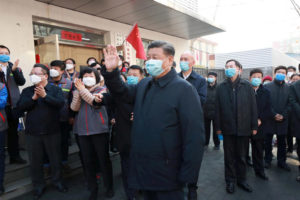Many course-changing events have happened in the month of June in Indian and world history. In recent Indian history the first of its kind, Operation Blue Star occurred between 1 June and 6 June 1984, ordered by the then Prime Minister Indira Gandhi, to remove militant religious leader Jarnail Singh Bhindranwale from the Golden Temple. It was again this month when nine years back on June 25th, 1975 she had clamped a state of internal emergency in the country and curbed civil liberties and ordered the press to be censored. I discussed Emergency Days last year in our inaugural issue in detail. This June we’ll have a peek in the world history.
The Night of the Long Knives (a phrase from a popular Nazi song) also called “Operation Hummingbird” or the “Rohm-Putch,” is considered an important day and a turning point in Germany’s history. It was an event during which Hitler’ SS troops committed a series of political murders to rid Hitler of possible political threats. These murders of the leaders took place between 30 June and 2 July 1934. Many of the people who were killed were the very people who had been loyal to Hitler and helped put him in power. It was the night, Adolf Hitler, too obsessed with fear and jealousy, got rid of all those players who could challenge his authority. In the list, mostly were his one time supporters, including his most loyal friend and devotee and head of his paramilitary wing, the SA.
In that summer of 1934, with one quick and hard action, Hitler had made it clear that he was the supreme ruler of the country who had the right to be judge and jury. The murders cemented an agreement between the Nazi regime and the German Army that enabled Hitler to proclaim himself Führer of National Socialist Germany and to claim absolute power.
In fact, immediately after coming to power in January 1933, Hitler started tearing up the Weimar constitution, squashing opposition and executing his plan to get rid of democracy in Germany. In the parliamentary elections of the Weimar Republic, in March 1933, the Nazis polled 44% of the vote, not enough for a majority. Within a fortnight Hitler proposed the Enabling Act, a temporary dissolution of the constitution. The formal title for the Enabling Act was the ‘Law to Remedy the Distress of People and Reich’. The Reichstag passed the proposal by 441 votes to 84 which had, in effect, thus voted away its own power though temporarily. And with this, Germany became a one-party state with Hitler its dictator.
Passing of the Enabling Act was not easy. Hitler could not be sure that the bill would be passed. Nazis had gained a majority of Deputy seats with the help of the German National Peoples Party. The Communists had been arrested and the party banned. Hitler made a deal with the Centre’s party leader, Ludwig Kaas, who advocated that the party support the bill. The only party that did not support the bill was the Social Democrats. The German constitutional law stated that any change to the constitution had to have a vote at which 66% of the Reichstag Deputies had to be present. Of these the vote needed to be 66% or over. The Social Democrats decided to boycott. The President of the Reichstag Hermann Goering introduced a new procedure. The new procedure was to deem present any Reichstag Deputy who was not at the session, but who did not have a good reason not to be there. In fact, 26 Social Democrat Deputies were in hiding for their lives – but as they could not present to the Reichstag a good reason for not being there they were counted as present.
Even when Adolf Hitler appeared to have complete control over Germany, he constantly feared that he might be ousted by others. So he used the tactic of “divide and rule” and encouraged other leaders to compete with each other for senior positions. One of the consequences of this policy was that these men developed a dislike for each other. The Sturm Abteilung (SA), led by a longtime Hitler friend and SA Chief of Staff Ernst Röhm, had expanded to a force of nearly three million men. The SA significantly outnumbered the German Army, which the Treaty of Versailles had limited to 100,000 men. Naturally, Rohm was particularly most hated because he had tremendous power and had the potential to remove any one of his competitors.
Three powerful leaders Reinhard Heydrich, Goering and Himmler assembled a dossier on Rohm and manufactured evidence that suggested that Rohm had been paid 12 million marks by the French to overthrow Hitler. Hitler initially refused to believe the dossier because Rohm had been one of his first supporters. He had played a very crucial role in the early days of the movement. In Hitler’s considered opinion, it was unlikely that the Nazis would have ever become established without Rohm.
Many industrialists, who had provided the funds for the Nazi victory, were unhappy with Rohm’s socialistic views on the economy and his claims that the real revolution had still to take place. There were fears that Rohm and other leaders took the “National Socialism” propaganda from the early Nazi times too seriously. This would foil Hitler’s plans to suppress workers’ rights in order to get in control of the German Industry and prepare Germany for war.
However, Ernst Rohm, as leader of the SA, also felt that Hitler had not given his due reward for helping the Nazis into power. He was very vocal talking of a ‘second revolution’ with him as the leader of the People’s Party. It was very alarming not only to Hitler, but also the army and its chief, Werner von Blomberg as Rohm declared to merge the army with the SA under his command. Generals were afraid that the SA, a force of over 3 million men, could easily absorb the much smaller German Army into its ranks thus making Rohm become their overall leader.
Hitler was again quick to act. Leaving no chance, he and Blomberg in April 1934, signed a secret pact. Under this pact Hitler promised Blomberg and the army full control of the military; and, in return, Blomberg promised Hitler the army’s support when the time came for Hitler to claim the presidency following the anticipated death of 86-year-old Paul von Hindenburg. After Hitler became chancellor in 1933, many political leaders, including President Paul von Hindenburg and Vice-Chancellor Franz von Papen, feared that the SA had become too powerful. The SA’s agitation was beginning to undermine the country’s stability, and Hindenburg threatened to bring in martial law unless Hitler could bring the situation under control. In other words – deal with Rohm and the SA. Hitler was also aware that Rohm and the SA had the power to remove him. This fear was doubled when he received the new information that Gregor Strasser, whom Hitler hated, was part of the planned conspiracy against him with Rohm.
Hitler ordered all the SA leaders to attend a meeting in the Hanselbauer Hotel in Wiesse. On the weekend of 30 June – 1 July 1934, in what was to become known as the ‘Night of the Long Knives’, Hitler, accompanied by the SS, arrived at Wiesse, where he personally arrested Ernst Rohm and executed his henchmen. Rohm was taken to a Munich prison, along with other SA leaders. But Hitler decided to pardon Rohm because of his past services to the movement. However, after much pressure from Goering and Himmler, Hitler agreed that Rohm should die. He offered Rohm the chance to kill himself. On 1 July, a revolver was left on the table in his cell and he was given ten minutes. Rohm refused, saying, ‘If I am to be killed, let Adolf do it himself’. When the ten minutes had elapsed and no shot heard, an SS officer marched in and killed Rohm at point blank range. It was rumoured that Hitler took the lives of more than 200 people whom he disliked, including the last Chancellor of the Weimar Republic, Kurt von Schleicher.
After that, Hitler was again as usual, quick to act. A new secret police force, the Gestapo, began arresting ‘unreliable’ persons putting them under custody in the first concentration camp Dachau. Freedom of the press was curtailed, trade unions were banned, and all other political parties declared illegal. Now Hitler wanted to win over the German people and international opinion through legitimate means not by force.
It made everyone happy: The army, relieved to be freed from its main rival, sided with Hitler, and Blomberg applauded “the Fuhrer’s soldierly decision and exemplary courage”. Hindenburg congratulated his chancellor for having acted so swiftly. He died soon after this and Hitler became an undisputed ruler. Hitler made Victor Lutze head of the SA who was a weak man and the SA gradually lost its power. The SS under the leadership of Himmler grew rapidly during the next few years, replacing the SA as the dominant force in Germany.
On July 3, the Reich Cabinet issued a law, legalizing the murders as an emergency action to save the nation. Hitler claimed that on that night 61 had been executed while 13 had been shot resisting arrest and three had committed suicide. In a powerful speech on July 13, 1934, Hitler explained why he had not relied on the courts to deal with the conspirators: “In this hour I was responsible for the fate of the German people, and thereby I become the supreme judge of the German people. I gave the order to shoot the ringleaders in this treason.” Goebbels launched a propaganda campaign to portray it as an effort to root out traitors who planned to overthrow the government and plunge Germany into political chaos.
But it made the later actions of the evacuation and annihilation of the Jewish people logical since the killings represented a vital watershed in terms of the regime’s preparedness to go outside the law to commit murder as an act of state for the survival of the nation.



